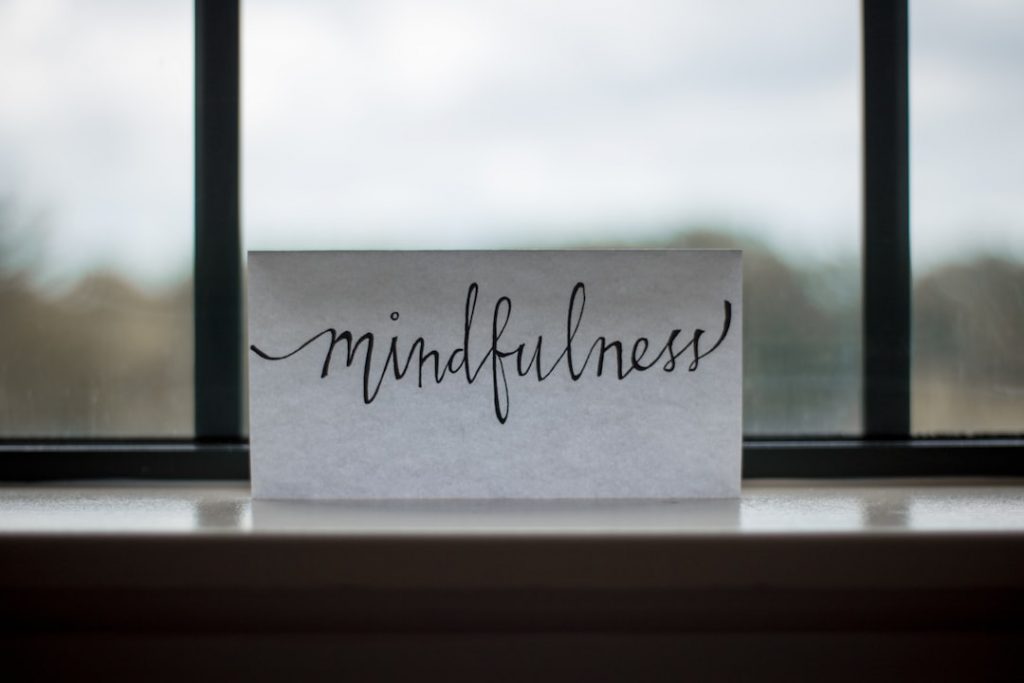The Power of Mindfulness: Effective Techniques for Stress Relief

This article explores the science and techniques behind mindfulness for stress relief, including deep breathing, body scan meditation, and mindful movement, and highlights the benefits of incorporating mindfulness into daily life for improved mental health.
Mindfulness: A Key to Stress Relief
Mindfulness is a transformative practice that can significantly alleviate stress and promote overall well-being. By embracing the state of intentional, nonjudgmental focus on the present moment, individuals can experience a range of benefits, including improved mood, reduced stress, and enhanced coping with pain. This intentional focus on the present moment allows individuals to develop a deeper sense of self-awareness and emotional regulation, leading to a more fulfilling and harmonious existence.
Consider a scenario where an individual is faced with a challenging and stressful situation at work. By practicing mindfulness techniques, such as deep breathing or mindful walking, the individual can interrupt the stress cycle and approach the situation with a greater sense of composure and clarity. This ability to respond thoughtfully rather than react impulsively is a hallmark of the mindfulness practice and can profoundly impact an individual’s overall well-being and stress management.
Understanding Mindfulness
Understanding mindfulness is crucial for those seeking to harness its stress-relieving benefits. Mindfulness involves intentionally focusing on the present moment without judgment, allowing individuals to cultivate a deep awareness of their immediate experiences and surroundings. This heightened sense of awareness can lead to improved mood, reduced stress, and better coping strategies for managing pain. By acknowledging the importance of being fully present in the moment, individuals can lay the foundation for a more balanced and composed approach to stressors in their lives.
Mindfulness is also instrumental in enhancing emotional regulation and fostering resilience. When individuals practice mindfulness, they are encouraged to acknowledge their thoughts and feelings without becoming overwhelmed by them, leading to a calmer and more composed response to challenging situations. This ability to be present in the moment and manage stress effectively is a valuable skill that can greatly enhance an individual’s overall well-being.
Research has shown that mindfulness practices can lead to a reduction in the physiological and psychological symptoms of stress. For example, studies have indicated that individuals who regularly engage in mindfulness techniques experience lower levels of cortisol, the stress hormone, and report a greater sense of calm and emotional stability. This scientific evidence underscores the profound impact of mindfulness on stress relief and emotional well-being, highlighting its potential as a transformative practice for individuals seeking to lead healthier, more balanced lives.
The Science of Mindfulness and Stress Relief
The science behind mindfulness and stress relief is a compelling area of study that sheds light on the profound impact of mindfulness practices on the human mind and body. By understanding the mechanisms through which mindfulness interrupts the stress cycle, individuals can gain valuable insights into how it can effectively manage stress and promote emotional resilience.
Research has demonstrated the effectiveness of mindfulness in addressing various mental health challenges. Studies have shown that mindfulness can lead to lower stress levels, improved symptoms of depression and anxiety, and even help treat insomnia. This scientific evidence provides substantial support for the stress-relieving benefits of mindfulness, making it a valuable resource for individuals seeking to manage stress and improve their mental health.
In addition to its emotional and mental health benefits, mindfulness has been shown to have a tangible impact on the physiological responses to stress. For example, research published in the Journal of Psychosomatic Research has indicated that mindfulness practices can lead to a reduction in the body’s inflammatory responses to stress, contributing to overall physical well-being. This intersection between mindfulness, stress relief, and physical health underscores the holistic nature of mindfulness as a practice that can positively impact all aspects of an individual’s well-being.
Studies have indicated that mindfulness interventions can lead to changes in the structure and function of the brain, particularly in areas associated with emotional regulation and stress responses. For example, research published in the journal Psychiatry Research has highlighted the neuroplasticity effects of mindfulness, demonstrating that regular mindfulness practices can lead to structural and functional changes in the brain that support improved stress management and emotional well-being. These scientific findings offer compelling insights into the profound impact of mindfulness on the human brain and its potential to transform the way individuals respond to and manage stress.
Different Mindfulness Techniques for Stress Relief
Mindfulness offers a variety of techniques that can be instrumental in relieving stress and promoting overall well-being. Deep breathing, for instance, is a simple yet potent relaxation method that can be seamlessly integrated into daily life. By taking slow, deep breaths and focusing on the sensation of air entering and leaving the body, individuals can activate the body’s relaxation response, leading to a reduction in stress and anxiety.
In addition to deep breathing, the body scan meditation and mindful walking are also valuable mindfulness techniques for stress reduction. The body scan meditation involves systematically directing attention to different parts of the body, observing physical sensations without judgment. This practice not only cultivates a heightened awareness of bodily experiences but also encourages the release of physical tension, thereby contributing to stress relief. Similarly, mindful walking, which involves walking deliberately and being fully present in the moment, can be a refreshing way to reduce stress. Whether it’s a leisurely stroll in a nearby park or a mindful walk during the lunch hour, this practice allows individuals to connect with nature, engage their senses, and step away from the pressures of daily life, promoting a sense of inner calm and rejuvenation.
Incorporating mindfulness into daily routines can be a powerful strategy for stress relief. For example, individuals can integrate mindfulness techniques into their morning or evening rituals, creating a sense of consistency and commitment to the practice. By setting aside regular time for mindfulness practice, individuals can gradually build a sustainable mindfulness habit that contributes to stress reduction and improved well-being.
The Power of Mindful Breathing
Mindful breathing is a fundamental mindfulness technique that offers a myriad of benefits for stress relief and overall well-being. This practice involves focusing on the breath, being fully present in the moment, and bringing attention to the inhalation and exhalation process. By doing so, individuals can cultivate a profound sense of calm and relaxation, which can be instrumental in alleviating stress and tension.
One specific example of the power of mindful breathing can be found in the workplace. When faced with a challenging task or a high-pressure situation, taking a few moments to engage in mindful breathing can help individuals regain their composure and approach the situation with a clearer, more composed mind. It can serve as a quick, accessible tool to reduce the immediate impact of stress and support a more focused, grounded mindset.
Mindful breathing can be practiced anywhere, making it a versatile technique for stress relief. Whether it’s during a hectic day at work, in the midst of a crowded commute, or at home during moments of restlessness, the ability to tap into the calming effects of mindful breathing can be invaluable. With regular practice, individuals can enhance their resilience to stress and improve their overall emotional well-being, making mindful breathing a simple yet powerful tool for managing the demands of daily life.
Body Scan and Mindful Movement: A Pathway to Relaxation
The body scan technique is a powerful mindfulness practice that involves systematically directing attention to different parts of the body, promoting relaxation and reducing stress. For example, during a body scan meditation, individuals can start by focusing on their toes, gradually moving their awareness up through the feet, ankles, calves, and so on, until they reach the top of their head. This method allows them to notice any areas of tension or discomfort and consciously release them, leading to an overall sense of calm and tranquility.
In addition to the body scan technique, engaging in mindful movements, such as rhythmic exercises like running or swimming, can induce a relaxation response. For instance, during a mindful run, individuals can focus on the sensation of their feet hitting the ground, the rhythm of their breath, and the sights and sounds around them. This type of mindful exercise not only reduces stress but also helps individuals feel more connected to their bodies and the present moment, further enhancing their overall well-being and mental clarity.
Integrating mindfulness techniques into various aspects of daily life, such as mindful eating or mindful movements during household chores, can serve as a consistent and effective approach to stress relief. By infusing mindfulness into everyday activities, individuals can develop a deeper sense of connection to the present moment, fostering a greater state of calm and balance in their lives.

Mindfulness Meditation for Stress Management
Mindfulness meditation is a transformative practice that empowers individuals to effectively manage stress and enhance their overall well-being. Through mindfulness meditation, individuals are encouraged to center their attention on the present moment, cultivating a deep awareness of their thoughts, emotions, and bodily sensations. This heightened awareness allows individuals to observe their stressors without judgment, fostering a non-reactive response to challenging situations. By developing this mindful approach, individuals can interrupt the stress cycle and prevent it from escalating into overwhelming anxiety or emotional distress.
An example of a mindfulness meditation technique is the body scan meditation, which involves systematically focusing on different parts of the body and the sensations they produce. This practice allows individuals to release tension and stress that may be held in different areas of the body, promoting relaxation and a sense of inner calm. Additionally, mindful breathing, a core component of mindfulness meditation, can interrupt the body’s stress response by promoting relaxation and reducing the physiological symptoms of stress. By incorporating mindfulness meditation into their daily routine, individuals can effectively manage stress, improve their emotional resilience, and cultivate a greater sense of peace and well-being.
Mindfulness meditation has been linked to improvements in attention, memory, and cognitive functions, which can contribute to a greater sense of mental clarity and emotional stability. Research published in the journal Neuroscience has indicated that regular mindfulness meditation practices can lead to structural changes in the brain that support improved cognitive functions and emotional regulation, further highlighting the holistic benefits of mindfulness for stress relief and overall well-being.
Incorporating Mindfulness into Daily Life
Incorporating mindfulness into daily life for stress reduction can be achieved through simple yet effective strategies. One practical tip is to set aside regular time for mindfulness practice, even if it’s just a few minutes each day. This could be in the form of a morning or evening routine to create a sense of consistency and commitment to the practice. By doing so, individuals can gradually build a sustainable mindfulness habit that contributes to stress reduction and improved well-being.
Utilizing smartphone apps or aids can be immensely helpful in the process of integrating mindfulness into daily life. There are numerous mindfulness and meditation apps available that offer guided sessions, breathing exercises, and reminders to practice mindfulness throughout the day. These apps can serve as convenient tools to support individuals in their mindfulness journey, making it easier to incorporate mindful moments into even the busiest of schedules. For example, apps like Calm, Headspace, and Insight Timer offer a variety of mindfulness practices and resources that cater to different preferences and needs, thereby enhancing the accessibility and convenience of mindfulness practice. By leveraging these digital resources, individuals can seamlessly integrate mindfulness into their daily routines, nurturing a sense of calm and resilience in the face of stressors.
Incorporating mindfulness into daily life extends beyond formal meditation practices. It can also involve infusing moments of mindfulness into everyday activities, such as mindful eating, mindful communication, or mindful engagement with nature. By embracing a mindful approach to daily life, individuals can cultivate a deeper sense of presence, connection, and emotional balance, leading to a more fulfilling and harmonious existence.
Mindfulness and Mental Health
The connection between mindfulness and mental health runs deep, as mindfulness has been shown to be a powerful tool for managing various mental health conditions such as anxiety, depression, and insomnia. For example, research has demonstrated that mindfulness can lower stress levels, alleviate symptoms of anxiety and depression, and even improve sleep quality, making it a valuable resource for those struggling with these challenges.
Mindfulness has been found to be as effective as medication for anxiety and depression, offering individuals an alternative treatment option that focuses on the mind-body connection and self-awareness. This is particularly significant considering the potential side effects and dependency issues associated with certain medications used to treat these conditions. Therefore, mindfulness not only provides relief from mental health struggles but also empowers individuals to take an active role in their well-being, promoting a sense of control and self-efficacy.
Research has indicated that mindfulness interventions can lead to improvements in emotional resilience and overall psychological well-being. For instance, a study published in the Journal of Clinical Psychology found that participants who engaged in mindfulness-based stress reduction practices reported significant reductions in perceived stress and improvements in emotional regulation, highlighting the transformative impact of mindfulness on mental health.
Let’s Sum it Up…
Mindfulness is a powerful practice that offers a wide array of benefits for stress relief and mental health improvement. By incorporating mindfulness techniques into daily life, individuals can effectively manage stress and enhance their overall well-being. Embracing mindfulness as a viable strategy for stress relief enables individuals to cultivate a more serene and balanced life, fostering resilience and inner calm in the face of life’s challenges. Through mindfulness, individuals can develop a deeper sense of self-awareness and emotional regulation, leading to a more fulfilling and harmonious existence. Mindfulness serves as a beacon of hope for those seeking to alleviate stress, enhance mental well-being, and lead a more balanced and fulfilling life.











